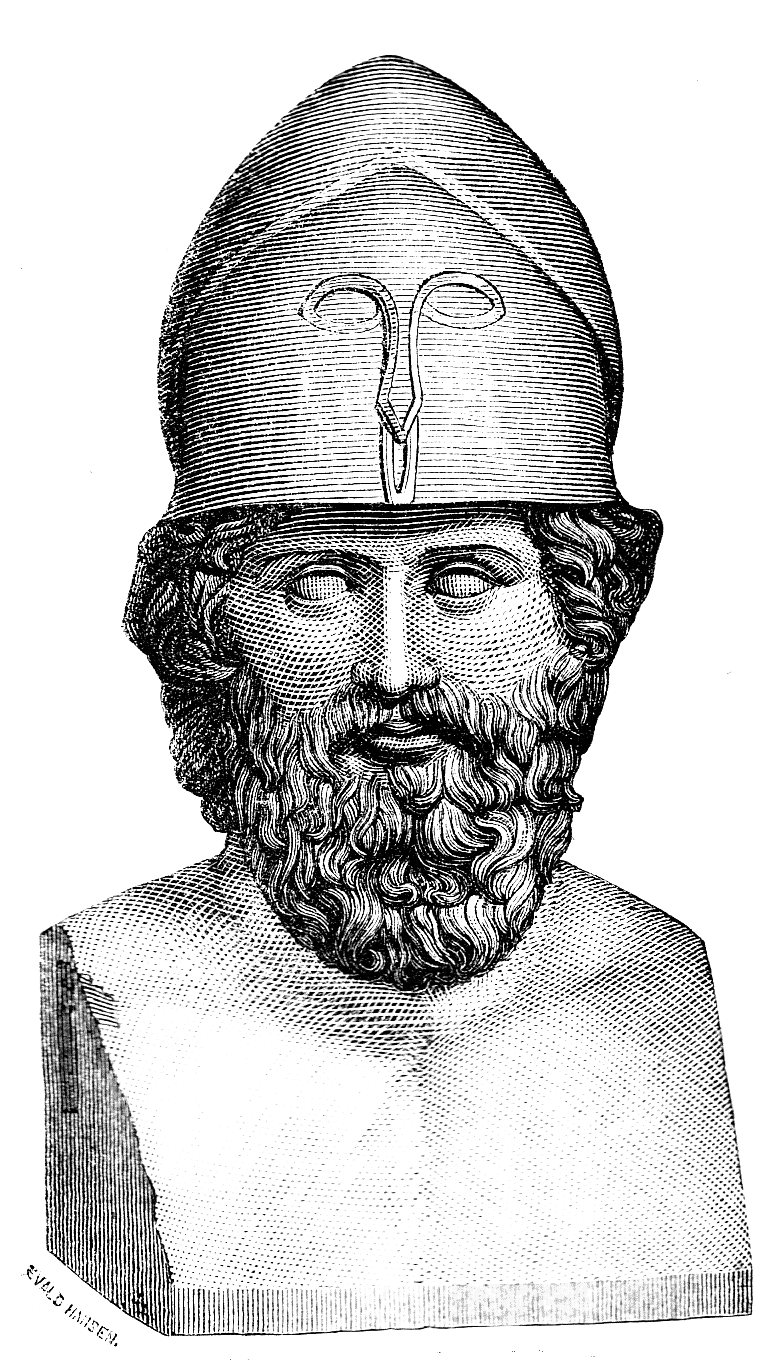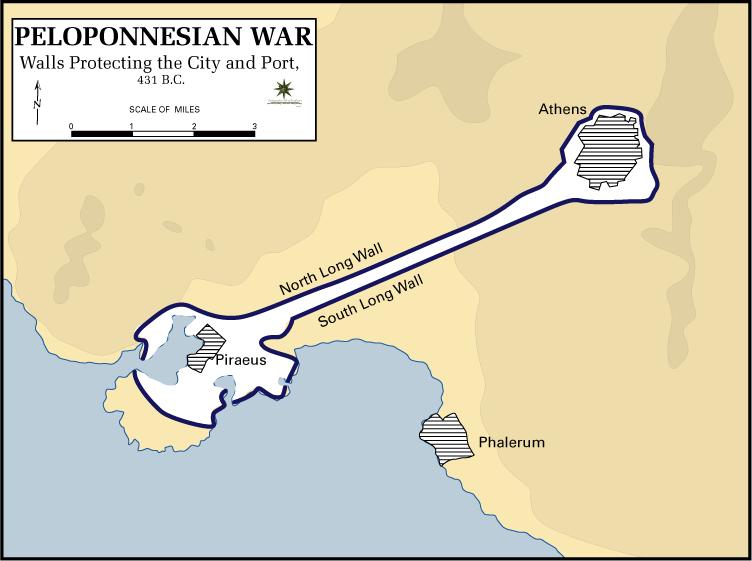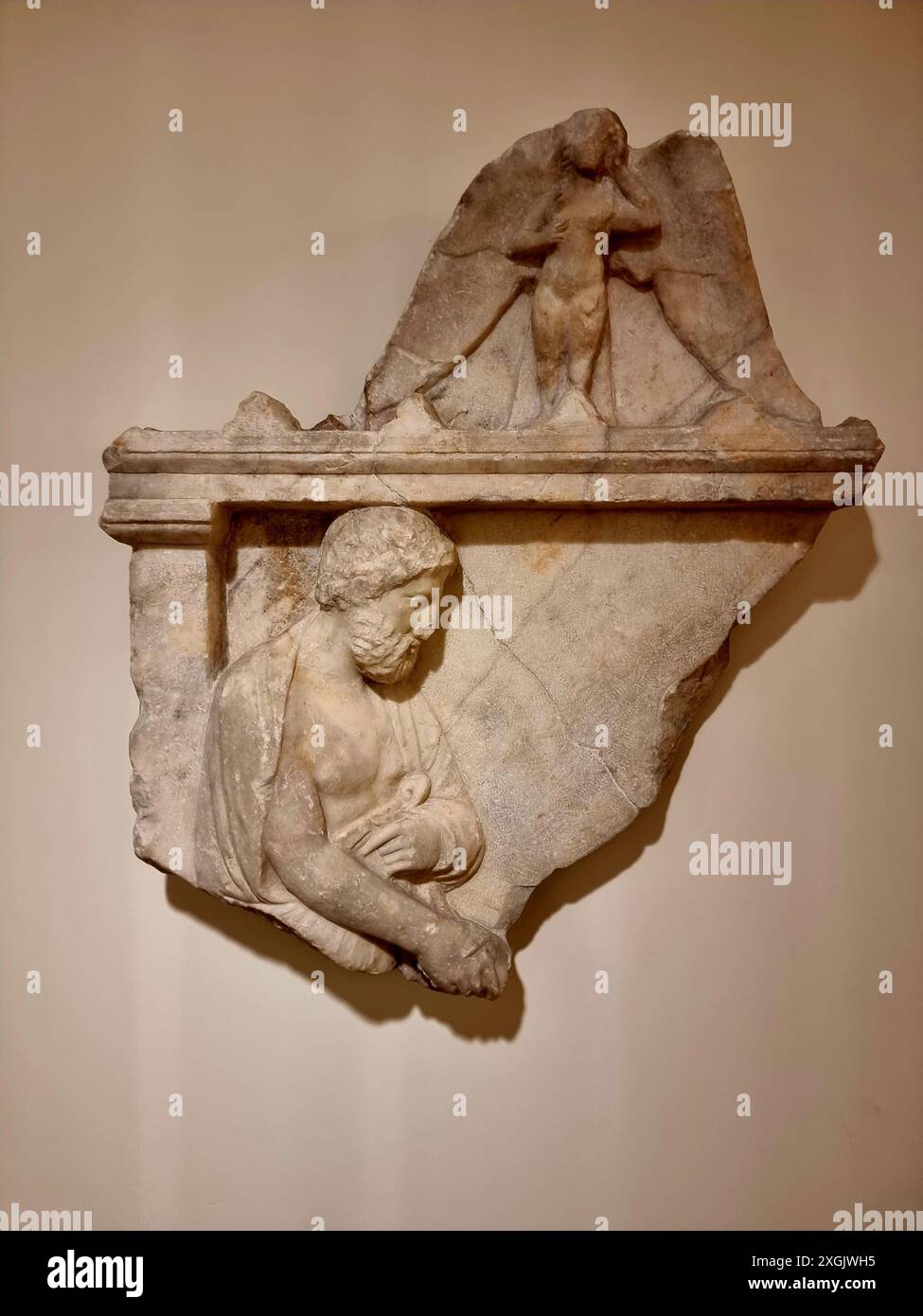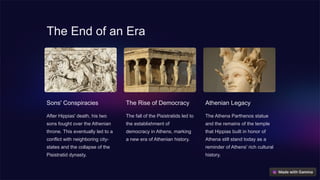The Immortal Legacy of Themistocles: Athens' Strategist Against the Persian Onslaught
In the annals of classical history, few figures loom as large as Themistocles, the Athenian general and statesman who played a pivotal role in shaping the destiny of Western civilization. Born into an era marred by political upheaval and burgeoning threats from the east, Themistocles emerges as a titan of strategic acumen, his legacy indelibly printed on the pages of not only Greek history but also the broader story of Europe.
Early Life and Rise to Prominence
Themistocles was born around 524 BCE, a citizen of Athens, which had recently thrown off the shackles of tyranny and was nurturing an infant democracy. His father, Neocles, was of modest means, which initially limited Themistocles' social standing. Yet it was precisely his humble origins that fueled his relentless ambition. From an early age, Themistocles exhibited a sharp wit and an insatiable hunger for knowledge—a combination that would become his hallmark.
Despite his limited pedigree, Themistocles quickly rose through the Athenian political ranks due to his extraordinary skill in rhetoric and his deep understanding of governance. By leveraging his oratorical prowess, he managed to win the fervent support of the common people, who saw in him a leader genuinely invested in Athens’ prosperity.
The Persian Threat: A Catalyst for Change
The backdrop to Themistocles' story is the ever-looming threat of the Persian Empire, which sought to expand its dominion into Greece. The Battle of Marathon in 490 BCE, where a heavily outnumbered Greek force achieved a miraculous victory against the Persians, offered only a temporary reprieve. Themistocles understood that this was merely the prelude to a much larger conflict.
His vision for Athens was uniquely foresighted. Recognizing that Athens' geographical advantage lay in its proximity to the sea, Themistocles proposed the augmentation of the Athenian navy. He argued for an unprecedented shipbuilding program to construct a formidable naval fleet, crucial for the defense against Persia’s imminent invasion. Despite fierce resistance from political opponents who favored land-based military strategies, Themistocles’ audacious gamble was ultimately supported by the Athenian populace.
The Naval Genius: The Battle of Salamis
The foresight of Themistocles was fully vindicated during the Second Persian Invasion, led by Xerxes in 480 BCE. With the Persian army sweeping through Greece, capturing city after city, Themistocles orchestrated one of the most brilliant naval strategies in history during the Battle of Salamis. Themistocles understood that the key to defeating the Persian behemoth lay in naval mastery.
Employing clever tactics, Themistocles lured the Persian fleet into the narrow Strait of Salamis, where their numerical advantage became a liability. The spatial constraints of the strait negated the Persians’ advantage in size and numbers, turning their densely packed ships into clumsy behemoths that were easily surrounded and dismantled by the agile Athenian triremes. The victory at Salamis was nothing short of spectacular, safeguarding Greek independence and ensuring the survival of Athenian democracy.
The Aftermath: Glory and Exile
In the aftermath of the Greek triumph, Themistocles' star shone brightly. Yet his success bred jealousy and enmity. The volatile nature of Athenian democracy, with its fickle allegiances and political machinations, soon turned against him. Rivals accused him of hubris and betrayal, and in an ironic twist of fate, Themistocles was ostracized—literally voted into exile by the very system he had labored to protect.
His later years were spent in Persia, serving ironically as a governor under the rule of the very empire he had thwarted. Despite his exile, Themistocles retained his wit and intellect, living his final years far from the Athens he had defended so valiantly.
Themistocles’ legacy endures not just in the victories he orchestrated but also in the strategic foresight he exhibited. His impact on naval warfare, his defense of democratic values, and his resilience in the face of adversity affirm his status as one of history's great military strategists. In the grand tapestry of history, Themistocles' story serves as an enduring testament to the power of vision, perseverance, and strategic insight.
Themistocles: A Master of Psychological Warfare
Beyond the obvious military genius displayed at the Battle of Salamis, Themistocles was also a pioneer in psychological warfare, an aspect of his leadership that sometimes receives less attention. He understood the art of deception and the critical role psychological tactics played in warfare, which he skillfully employed to manipulate both allies and adversaries alike.
Before the pivotal Battle of Salamis, Themistocles devised a cunning ruse to convince Xerxes to engage in battle. He sent a message, through a trusted emissary, to the Persian king, indicating that the Greeks were retreating and could be easily defeated if the Persians attacked immediately. Themistocles anticipated that Xerxes, eager for a swift victory, would seize the opportunity. This stratagem not only succeeded in goading the Persian fleet into a confined geographical location where their numbers would be disadvantaged but also ensured that the Greek city-states committed to the battle, as they could not afford to leave the Athenians to face the consequences of desertion alone.
The psychological depth of Themistocles' tactics extended beyond the battlefield. He was acutely aware that wartime morale hinged on perception and manipulation of information. By crafting narratives that inspired confidence in his forces and sowed discord among his adversaries, Themistocles demonstrated a precursory understanding of propaganda's role in warfare, centuries before the term came into popular usage.
The Architect of Athenian Naval Power
Themistocles’ vision for Athens was inherently linked to naval supremacy. He was convinced that the future prosperity and security of Athens depended on its command of the sea. This doctrine fundamentally altered not just military strategy but also the economic, political, and cultural landscape of Athens.
By advocating for the expansion of the Athenian navy, Themistocles facilitated Athens’ transformation into a formidable maritime power. This shift underpinned Athens' dominance during the subsequent Delian League period, where its fleet safeguarded and expanded Greek trade routes, turning Athens into a thriving economic metropolis.
Moreover, Themistocles' naval policy paved the way for Athens to assert significant influence over other Greek city-states, directly contributing to the city's Golden Age. The prosperity generated by maritime prowess allowed Athens to invest in public works, culture, and arts, fueling an era of unprecedented cultural achievements which laid the groundwork for Western civilization’s intellectual heritage.
Democracy and Dissent: Themistocles' Complex Relationship with Political Power
The realist and opportunist in Themistocles allowed him to navigate Athens' complex democratic landscape. His ability to understand and manipulate the nuances of public sentiment was critical to his political ascent. The very skills that propelled him to the pinnacle of power also sowed the seeds of his eventual downfall.
As an advocate of democracy, Themistocles made significant contributions to its establishment by empowering the lower classes, further diversifying and strengthening the civic body of Athens. He championed reforms that enabled broader participation in the political system, in turn making him popular amongst the common populace. However, his sometimes-controversial methods and outsider persona strained his relationships with Athens’ traditional aristocracy.
His political rivalries, often with other powerful figures such as Aristides, revealed the inherent fragility of his position in the volatile Athenian political climate. While he was skilled in using democratic mechanisms to his advantage, the democratic process that he once championed ultimately ousted him through ostracism—an indication of the fluctuating nature of public opinion and the danger of overstepping political bounds.
Exile and Legacy
The exile of Themistocles is a stark reminder of the precarious nature of political fortune. While his contributions to Athens’ security and prosperity were monumental, his enemies succeeded in tarnishing his reputation, alleging treachery and betrayal during wartime. The very democracy he fortified turned against him, and he was forced to seek refuge in the lands of his erstwhile enemies, the Persians.
In service to Persia, Themistocles demonstrated adaptability and resilience, ingratiating himself with the Persian king Artaxerxes, serving as a governor in Magnesia. Despite harboring an uncomfortable alliance with his former adversaries, Themistocles maintained his integrity and intellectual vigor until his death, which was surrounded by intriguing myths and legends about possible poisoning by his own hand—a dramatic reflection of the tragic hero archetype.
Ultimately, Themistocles' complex legacy is that of a statesman whose foresight, ingenuity, and bold strategies secured Athenian greatness. His influence persisted long after his death, with subsequent generations recognizing the indelible impact of his leadership. Today, Themistocles does not just occupy a chapter in history; he stands as an embodiment of strategic brilliance and a testament to the profound impact one individual can have on shaping the course of history.
Themistocles’ Impact on Western Civilization
As we delve deeper into the reverberations of Themistocles’ actions, it becomes increasingly clear that his contributions extended far beyond the immediate military and political sphere of ancient Greece. The broader implications of his leadership laid foundational stones for Western civilization itself.
The decisive triumph at Salamis, which Themistocles orchestrated, was more than a military victory; it was a pivotal preservation of a culture. The Greek victory impeded Persian expansion into Europe, thereby safeguarding the nascent democratic ideals flourishing in Athens. if Persia had succeeded in conquering Greece, the trajectory of European civilization could have taken a markedly different course, potentially stifling the development of classical democracy, philosophy, art, and science that grew prolifically in the relative peace that followed.
Themistocles’ insistence on naval power also had enduring effects. With Athens dominating the Aegean Sea, the city-state was able to foster an environment ripe for intellectual and artistic evolution. This epoch—perhaps best epitomized by the works of Socrates, Plato, and Aristotle—laid the intellectual groundwork for Western thought, influencing countless generations. Without Themistocles’ foresight and leadership, these cultural milestones might have faltered, significantly altering the legacy of classical antiquity.
Themistocles as a Symbol of Strategic Innovation
Themistocles’ story is one of profound innovation in strategy and governance. His life offers timeless lessons on the virtues of adaptability, foresight, and tenacity. As a leader, Themistocles eschewed rigid traditionalism, electing instead to focus on practical solutions founded on a realistic appraisal of circumstances. His ability to anticipate threats and exploit opportunities exemplifies a model of strategic thinking that is studied and admired in academic and military circles to this day.
Themistocles embodied the principle that effective leadership often requires visionary thinking coupled with the courage to implement those visions despite opposition. In modern contexts, his strategies have been examined by scholars of military history and leadership studies, underlining that in any era, the value of bold, decisive action aligned with strategic insight cannot be overstated. Moreover, his life serves as a powerful reminder of how deeply individual influence can be felt across history.
Themistocles in Culture and Literature
Themistocles’ remarkable life has not only filled pages of history books but has also inspired countless cultural and literary works. His life and exploits have been immortalized in the writings of ancient historians like Herodotus and Plutarch, who explored both his military genius and his complicated political fate. These accounts, while sometimes dramatized, offer rich insight into the zeitgeist of the era and Themistocles’ indelible role within it.
Moreover, his legacy persisted in the arts, appearing as a character in plays and novels that examine themes of patriotism, strategy, and human fallibility. In these depictions, Themistocles often emerges as a larger-than-life figure, embodying the age-old archetype of the tragic hero whose brilliance is both his greatest asset and detriment.
These cultural representations help humanize Themistocles, offering a multifaceted view of his character that balances his triumphs with his personal and political struggles. They serve as a testament to his enduring legacy as a symbol of strategic acumen and the often-tumultuous relationship between individual ambition and democratic governance.
Conclusion: Lessons from Themistocles for the Modern World
The legacy of Themistocles transcends the ancient Mediterranean world, offering lessons that resonate in contemporary society. In a world where geopolitical strategies, leadership dilemmas, and the importance of foresight are as pertinent as ever, Themistocles provides a compelling case study in navigating complex political and military landscapes.
His life teaches modern strategists and leaders the importance of adaptability, the power of naval and on-the-ground intelligence, and the need to inspire and empower the populace one serves. Additionally, Themistocles’ experience underscores the importance of balancing foresight and ambition with ethical considerations and the potential consequences of individual hubris.
As leaders, historians, and students continue to draw insights from his life, Themistocles remains a beacon of strategic thinking and pioneering spirit. His profound impact on the fabric of Western civilization serves as a timeless reminder of the pivotal role individuals can play in shaping the destiny of nations. In this, Themistocles’ name is enshrined not merely in the history of Greece but in the collective memory of human perseverance and intellectual resilience.









Comments